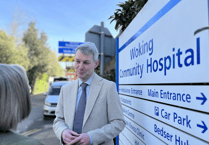We all know that pharmacies are an integral part of the fabric of our communities, staffed by highly trained and skilled healthcare professionals.
Four in five of us can reach our local community pharmacy within a 20-minute walk and there are, on average, twice as many pharmacies in the most deprived communities.
Last week, the government launched the new Pharmacy First service, making even better use of our highly trained community pharmacists.
For the first time, community pharmacies in England will be able to offer NHS consultations and supply prescription-only medicines without a prescription from a GP for seven common conditions. The seven conditions are: earache, sinusitis, sore throat, impetigo, infected insect bite, shingles and uncomplicated urinary tract infections in women under the age of 65.
Ministers and NHS England have worked closely with Community Pharmacy England, the representative body of all pharmacy contractors in England, on the detail of three services. The funding for additional blood-pressure checks is already flowing to community pharmacies and contraception services are also being expanded. Completing this set of delivery milestones is the launch of Pharmacy First.
This initiative builds on existing clinical services already introduced into community pharmacies, such as the ability for GPs, NHS111 and for urgent and emergency care to refer patients to a community pharmacist for a minor illness consultation, and for NHS111 and urgent and emergency care to refer patients for an urgent medicine supply. Yesterday (Thursday, February 8, 2024) this became part of the wider Pharmacy First Service.
Over 10,000 community pharmacies (about 95 per cent) have signed up to start offering Pharmacy First to their local communities. Patients are able to walk into a pharmacy to access the service or alternatively they may be referred to a community pharmacy by their GP, NHS111 or UEC.
This government has a clear plan to back the pharmacy workforce. The NHS Long Term Workforce Plan commits £2.4 billion to fund additional education and training places over the next five years. This includes an ambition to increase training places for pharmacists across England by nearly 50 per cent to around 5,000 by 2031-32, and to grow the number of pharmacy technicians.
NHS England has also invested £15.9 million on pharmacy professional career development. NHS England and the Centre for Pharmacy Postgraduate Education offer a range of support to upskill the current workforce with clinical examination skills.
From 2026, all newly qualified pharmacists will be independent prescribers on the day of registration. New pharmacists will be equipped with the skills to provide even more clinical care and be able to expand the clinical role of pharmacists across the NHS, including in community pharmacy.
The government has a clear vision and plan to support pharmacists to evolve into a more clinically focused role, with members of the public able to take full advantage of their skills and capabilities.
Pharmacy First shows we are serious about delivering against this vision. This is part of our overall plan to make the NHS and social care system faster, simpler and fairer for everyone.
Readers will know that our local NHS is one of my top priorities. The government’s long-term plan for NHS services, including Pharmacy First, coupled with the new diagnostic centre (that I’ve helped to secure at Woking Community Hospital) opening this year means that our NHS will be well placed to meet the growing healthcare demands that are expected over the coming years.




